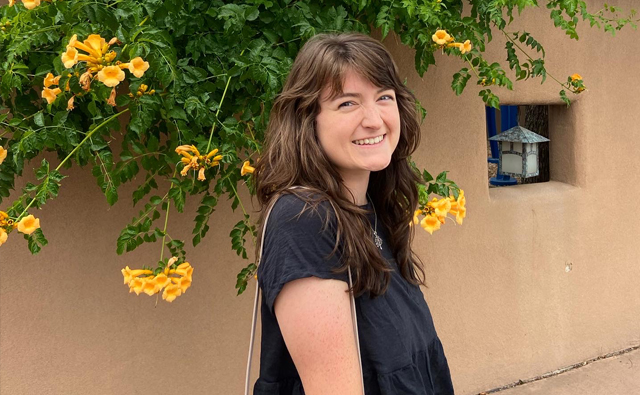Kayla Solsbak Wins S3 President’s Award for Research that Champions the Unsung Voices of Women

Her research highlights issues of the United Farm Workers union in the 1960s and 70s
For Kayla Solsbak, second-year master’s student in history, interest in the United Farm Workers (UFW) is personal. Her grandmother was a farm worker as a child in Imperial Valley. “It's something that has been on my mind for my whole childhood — I wondered what her experience was like,” Solsbak said.
She questioned historical experiences of people in her own family and when she began thinking about going to graduate school for history. “I thought that this would be a good way to pay homage to my family — to look at their experiences from an academic lens,” Solsbak said. “As I started to look into the history of the UFW, it became very clear that women were missing from the picture. They were missing from what had been written already about the UFW.”
In her work, she seeks to bring to light the importance of women in the UFW — to champion these unsung voices in the stories that may have been buried intentionally or not. When she was an undergraduate in journalism, untold stories were always at the forefront of her mind.
In her award-winning SDSU Student Symposium (S3) presentation: “The Feminine Presence: Gender Discourse in the United Farm Workers’ Newspaper,” Solsbak looked at the public presentation of gender perpetuated by the UFW in the 1960s and 70s.
“I think the greatest takeaway of this research was to see how the union's priorities changed over time and how it affected the way gender was represented,” Solsbak said. “What people don't know about the union is that their priorities shifted away from grassroots organizing among farm worker communities, and more toward getting mostly white supporters in urban and suburban areas to support the boycott efforts.”
That shift in UFW priorities, translated to the language and messaging in the union newspaper El Malcriado, which was the specific area of focus for this project.
Solsbak said, “We have to look at how certain people were marginalized in the union, so that we don't repeat those same power imbalances in future movements. And so it's a complicated legacy that as a society we haven't been quite willing to unpack.“
To gather research on the subject, Solsbak used a grant to travel to the UFW’s main archive library in Detroit, Michigan in spring 2022. “I had never had an in-depth, archival experience like that. So it was a great growing opportunity,” she said. In fall 2022, her second research trip took her to the Yale University archives, where she completed her research. She did much of her research on El Malcriado in the digitized collection, but going to the archives offered a valuable physical perspective of the newspaper.
David Cline, history professor, and mentor to Solsbak said, “There's nothing, and I say this as a historian, that replaces that actual experience of being in the archive. We can and we try to replicate it electronically and access things digitally, but getting to go and get your hands on the documents is priceless.”
Cline said of Solsbak, “She has this stack of awards already — the Graduate Equity Fellowship, Completion of Research Fellowship, Lionel Ridout Memorial Scholarship, Graduate Student Travel Fund, and Richard Reutten Memorial Scholarship.” All these awards have given Solsbak access and opportunities to complete her research.
The S3 gave Solsbak an opportunity to publicly share her research for the first time.“I was really really emboldened by the amount of engagement I got from jurors' and audience questions,” she said. “It was ultimately a very validating experience, knowing that people are interested in this research, it holds some amount of weight, and that's a really good sign.”
About the symposium, Cline said, “It is an influential and key experience — a training ground and platform. It’s a place for our students to show off their chops, and for Kayla as a graduate student, but especially for the undergraduates, having a chance to operate within a conference environment is wonderful preparation for them as they go forward in their careers — because they'll be doing a lot of conferences. It's a nice first step and it's judged at a very high level.”
